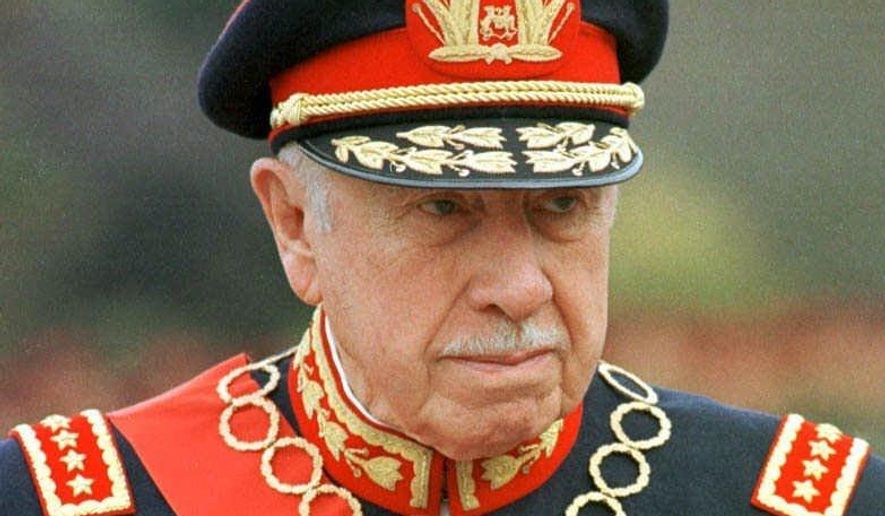ORLANDO, Fla. (AP) - The ghosts of the brutal dictatorship of Chile’s Augusto Pinochet are coming to a Florida courtroom with a civil trial involving a military officer and a popular singer who was beaten and shot to death more than four decades ago.
The family of Chilean folk singer Victor Jara is suing the former military officer for damages, claiming that former Lt. Pedro Pablo Barrientos Nunez was in charge of soldiers at the stadium where Jara was tortured and killed in the days after Pinochet’s coup d’etat in 1973. The coup led to the torture and disappearance of thousands of political opponents.
Barrientos moved to the United States in 1989 and lives in central Florida. The trial starts Monday in federal court in Orlando, more than 4,000 miles from where Jara disappeared and was killed.
Jara’s wife, Joan; his daughter, Amanda, who was 8 when her father died; and his stepdaughter, Manuela, who was 13, filed the lawsuit under the Torture Victim Protection Act, which allows civil lawsuits to be filed in the United States against people who have committed torture.
Joan Jara said in a statement that the trial “extends to all who have spent so many decades searching for answers about their loved ones who were tortured, disappeared, or killed at the hand of the Pinochet regime.”
Victor Jara was a popular singer and political activist who worked for the candidacy of Salvador Allende, a Socialist who was elected president of Chile in 1970. Allende’s efforts to nationalize industries, including the takeover of U.S.-owned copper companies, drew fierce opposition internally and from the United States, which opposed leftist influences in Latin America amid the Cold War.
In September 1973, Pinochet, an Army commander, orchestrated a coup against Allende’s government. Allende killed himself after unsuccessfully leading a resistance to a military assault on the presidential palace. Pinochet and the military junta he headed shut down congress, opposition political parties and trade unions. Soldiers rounded up Allende supporters and ideological enemies and sent them to the stadium where many were tortured or disappeared.
Years later, various commissions determined that almost 3,200 people were killed or went missing between 1973 and 1990, when Pinochet’s dictatorship ended, and tens of thousands of individuals were either tortured or arrested and interrogated.
The Central Intelligence Agency said in a report issued in 2000 that it was aware of the coup plotting but that it didn’t instigate it. Some historians argue that U.S. efforts to destabilize Allende’s government helped foment the coup.
The Jara lawsuit contends that the music and political beliefs of the popular singer, emphasizing social inequality, were a threat to Pinochet’s young government. Victor Jara was arrested during an army assault on the university where he worked, and he was transported to the stadium that had been converted into a makeshift prison for some 5,000 detainees. He was taken to an underground locker room where he was brutally beaten and then shot more than 40 times, including in the head, according to the lawsuit.
Barrientos and soldiers under his command were among those deployed to the stadium, the lawsuit said.
“Defendant was in command of the mass detention of detainees at the stadium,” the lawsuit said.
Barrientos’ attorney, Luis Calderon, refused to comment ahead of the trial.
In court papers, Barrientos argued that the Jara family’s claims are barred by statute of limitations and that they should be handled in Chile. Barrientos’ attorneys also argued that the Jara family was no longer relying on the claim of a witness who had previously said Barrientos shot Jara while playing Russian roulette, raising questions about what role, if any, Barrientos played in his death.
“These generic allegations fall far short of describing how Mr. Barrientos acted with purpose or intent to bring about the torture and extrajudicial killing,” Barrientos said in court papers.
In 1978, Joan Jara attempted to have a criminal investigation opened in Chile, but those efforts were thwarted by a law granting amnesty to anyone who committed crimes from 1973 to 1978. In 2012, the Santiago Court of Appeals charged Barrientos as a perpetrator in the killing of Jara but couldn’t move forward with a prosecution because Chilean law doesn’t allow for prosecutions in absentia. That has left the family without any options to pursue justice in Chile, the lawsuit said.
Relatives of victims of the Pinochet regime have successfully sued military leaders successfully in courts.
In 2003, a jury in Miami awarded $4 million to the family of a Chilean economist who was executed by a military squad known as the “Caravan of Death.” While the Jara family is seeking damages, what’s more important is shedding light on what happened in the stadium to the detainees, said Dixon Osburn, executive director of The Center for Justice & Accountability, which helped both families file their cases against the former Pinochet-regime soldiers.
While imprisoned for three days at the stadium, Victor Jara wrote a poem that was delivered to his wife by a fellow detainee, according to the lawsuit.
“How hard it is to sing when I must sing of horror,” he said. “Horror which I am living, horror which I am dying.”




Please read our comment policy before commenting.